The Continuous Inkjet Printers Market is estimated to be valued at USD 1.9 billion in 2025 and is projected to reach USD 3.0 billion by 2035, registering a compound annual growth rate (CAGR) of 5.0% over the forecast period.
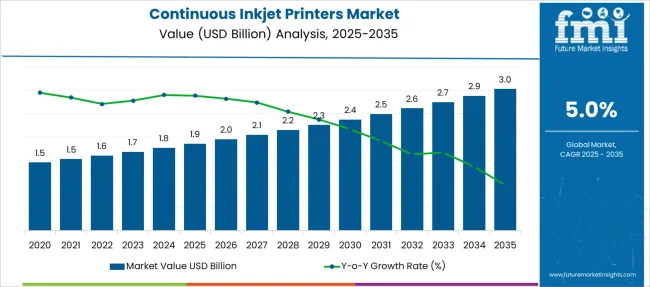
| Metric | Value |
|---|---|
| Continuous Inkjet Printers Market Estimated Value in (2025 E) | USD 1.9 billion |
| Continuous Inkjet Printers Market Forecast Value in (2035 F) | USD 3.0 billion |
| Forecast CAGR (2025 to 2035) | 5.0% |
The continuous inkjet printers market is advancing steadily, supported by increasing demand for high-speed, non-contact marking systems in fast-moving consumer goods, electronics, and packaging sectors. Operational efficiency and uninterrupted performance in continuous production lines have been prioritized by manufacturers, driving adoption of CIJ systems across diverse substrates.
Additionally, growing regulatory requirements for traceability, batch coding, and serialization in food, beverage, and pharmaceutical industries have elevated the relevance of advanced inkjet technologies. Enhanced print resolution, solvent flexibility, and improvements in printhead durability are fostering wide applicability even in challenging manufacturing environments.
As industrial automation accelerates and zero-downtime printing becomes a production imperative, demand for robust, low-maintenance, and high-speed printers is expected to sustain the market’s upward trajectory.
The market is segmented by Line Speed, Lines of Print, Substrate, and End Use Industry and region. By Line Speed, the market is divided into 500 m/min & above and 200-400 m/min. In terms of Lines of Print, the market is classified into Up to 3 lines, Maximum 5 lines, and Above 5 Lines. Based on Substrate, the market is segmented into Plastic, Metals, Glass, Paper, Wood, and Others. By End Use Industry, the market is divided into Food & beverages, Cosmetics, Automobile, Electronics, Pharmaceutical, and Others. Regionally, the market is classified into North America, Latin America, Western Europe, Eastern Europe, Balkan & Baltic Countries, Russia & Belarus, Central Asia, East Asia, South Asia & Pacific, and the Middle East & Africa.
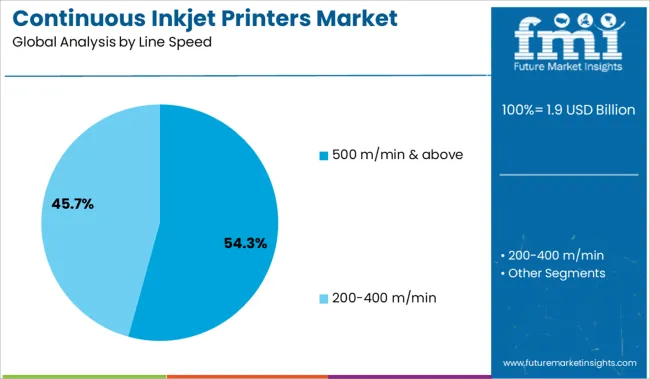
The 500 m/min & above line speed category is projected to dominate the market with a 54.3% share in 2025. Its leadership is attributed to rising adoption across high-throughput manufacturing lines where consistent, high-speed coding is essential for operational efficiency.
The ability to print at ultra-fast speeds without sacrificing readability or accuracy has made this segment ideal for automated and high-volume production setups. This preference is being driven by sectors such as food processing, beverage bottling, and industrial labeling, where packaging lines often exceed conventional speed thresholds.
Further, manufacturers are focusing on scalable printing solutions that maintain quality under high stress, positioning this speed segment as the benchmark for modern industrial operations.
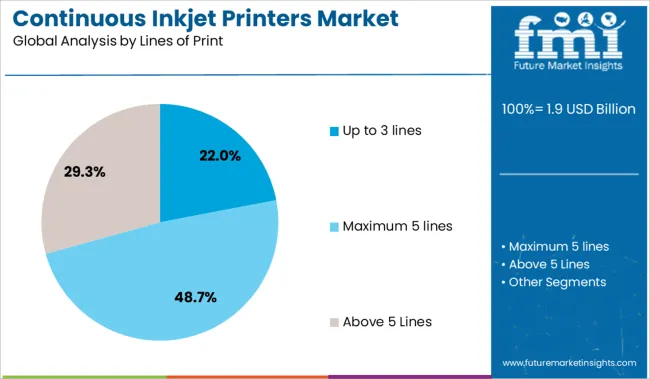
By lines of print, the segment with up to 3 lines is expected to lead in 2025, driven by the balance it offers between operational simplicity and essential data imprinting. These configurations fulfill the requirements for date coding, batch identification, and alphanumeric markings in most production environments.
Preference for fewer lines stems from the need for compact and readable prints on limited label or surface areas, especially in sectors prioritizing minimalist design and fast legibility. Their cost efficiency, ease of integration, and minimal ink usage have further propelled their acceptance in both medium and large-scale operations.
As production shifts toward streamlined data imprinting for traceability without overloading packaging visuals, this segment remains the preferred choice for standard coding applications.
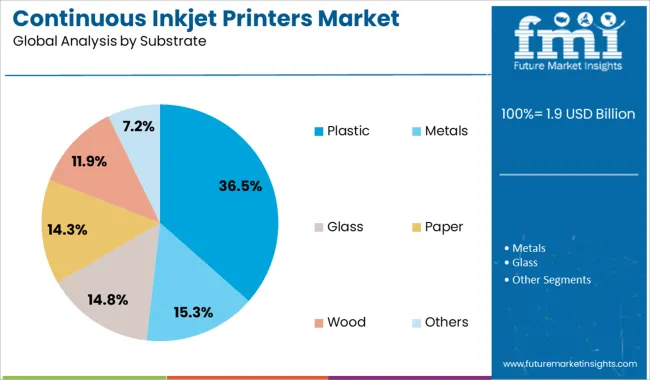
Plastic is anticipated to remain the dominant substrate segment, capturing 36.5% of total revenue share by 2025. This leadership position is supported by widespread use of plastic materials in packaging across FMCG, pharmaceutical, and consumer electronics sectors.
Continuous inkjet printers are favored for their ability to deliver smudge-resistant, fast-drying prints on smooth plastic surfaces at industrial speeds. The compatibility of modern CIJ inks with diverse plastic grades, including polyethylene and polypropylene, has extended usability across bottles, caps, films, and wrappers.
Rising emphasis on recyclable and lightweight packaging materials has further expanded plastic's role in modern manufacturing, ensuring sustained demand for compatible high-performance printing solutions.
The continuous inkjet printers market is growing with evolving printing industry. Rapid growth of industrialization across the globe is expected to drive the global continuous inkjet printer market over the next decade. In packaging, various industries such as food & beverage, cosmetics, pharmaceutical, automotive, electronics and others, need printing to promote their products.
These factors are expected to drive the continuous inkjet printer market growth over the forecast period. The ability of continuous inkjet printers to print on any substrate, is expected to drive the growth of the continuous inkjet printer market. The growing penetration of advertisement in the market is expected to drive the global continuous inkjet printer market growth over the next decade.
The continuous inkjet printer is able to print on any kind of substrates such as metal, plastic, wood, paper, glass and others. This factor is expected to drive the global continuous inkjet printer market growth over the next ten years. Printing of barcodes and company’s logo on product is important for the manufacturer and this is done easily with continuous inkjet printer.
This is expected to drive the global continuous printer market growth. These printers are available in various print speeds. The factor which might affect the global continuous inkjet printer market is availability of other printing technologies in the market.
Based on regions, the global continuous inkjet printer market is divided into seven regions namely:
APEJ region is expected to witness high growth due to rapid industrialization in the region and growing competition among manufacturers. North America and Western Europe markets are expected to witness average growth due to established market in the regions. The Latin America market is anticipated to witness high growth due to promising growth in advertising industry in the coming years.
The Eastern Europe and Middle East & Africa continuous inkjet printer market are expected to witness average growth during the forecast period due to sluggish growth in printing industry. The Japan continuous inkjet printer market is expected to register average growth due to highly saturated market.
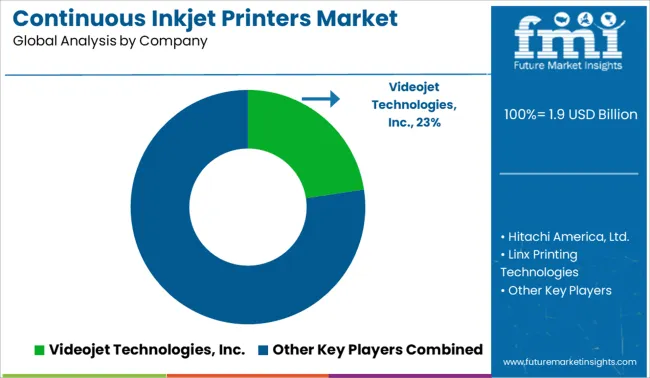
The key players in global inkjet printer market are - Videojet Technologies, Inc., Hitachi America, Ltd., Linx Printing Technologies, Paul Leibinger GmbH & Co. KG, Keyence Corporation, Control Print Ltd., Markem-Imaje among others.
The research report presents a comprehensive assessment of the market and contains thoughtful insights, facts, historical data, and statistically supported and industry-validated market data. It also contains projections using a suitable set of assumptions and methodologies. The research report provides analysis and information according to market segments such as geographies, application, and industry.
The global continuous inkjet printers market is estimated to be valued at USD 1.9 billion in 2025.
The market size for the continuous inkjet printers market is projected to reach USD 3.0 billion by 2035.
The continuous inkjet printers market is expected to grow at a 5.0% CAGR between 2025 and 2035.
The key product types in continuous inkjet printers market are 500 m/min & above and 200-400 m/min.
In terms of lines of print, up to 3 lines segment to command 0.0% share in the continuous inkjet printers market in 2025.






Our Research Products

The "Full Research Suite" delivers actionable market intel, deep dives on markets or technologies, so clients act faster, cut risk, and unlock growth.

The Leaderboard benchmarks and ranks top vendors, classifying them as Established Leaders, Leading Challengers, or Disruptors & Challengers.

Locates where complements amplify value and substitutes erode it, forecasting net impact by horizon

We deliver granular, decision-grade intel: market sizing, 5-year forecasts, pricing, adoption, usage, revenue, and operational KPIs—plus competitor tracking, regulation, and value chains—across 60 countries broadly.

Spot the shifts before they hit your P&L. We track inflection points, adoption curves, pricing moves, and ecosystem plays to show where demand is heading, why it is changing, and what to do next across high-growth markets and disruptive tech

Real-time reads of user behavior. We track shifting priorities, perceptions of today’s and next-gen services, and provider experience, then pace how fast tech moves from trial to adoption, blending buyer, consumer, and channel inputs with social signals (#WhySwitch, #UX).

Partner with our analyst team to build a custom report designed around your business priorities. From analysing market trends to assessing competitors or crafting bespoke datasets, we tailor insights to your needs.
Supplier Intelligence
Discovery & Profiling
Capacity & Footprint
Performance & Risk
Compliance & Governance
Commercial Readiness
Who Supplies Whom
Scorecards & Shortlists
Playbooks & Docs
Category Intelligence
Definition & Scope
Demand & Use Cases
Cost Drivers
Market Structure
Supply Chain Map
Trade & Policy
Operating Norms
Deliverables
Buyer Intelligence
Account Basics
Spend & Scope
Procurement Model
Vendor Requirements
Terms & Policies
Entry Strategy
Pain Points & Triggers
Outputs
Pricing Analysis
Benchmarks
Trends
Should-Cost
Indexation
Landed Cost
Commercial Terms
Deliverables
Brand Analysis
Positioning & Value Prop
Share & Presence
Customer Evidence
Go-to-Market
Digital & Reputation
Compliance & Trust
KPIs & Gaps
Outputs
Full Research Suite comprises of:
Market outlook & trends analysis
Interviews & case studies
Strategic recommendations
Vendor profiles & capabilities analysis
5-year forecasts
8 regions and 60+ country-level data splits
Market segment data splits
12 months of continuous data updates
DELIVERED AS:
PDF EXCEL ONLINE
Market Share Breakdown of Continuous Inkjet Printers Providers
Continuously Variable Transmission (CVT) Market Size and Share Forecast Outlook 2025 to 2035
Continuous Ambulatory Peritoneal Dialysis Bags Market Size and Share Forecast Outlook 2025 to 2035
Continuous Motion Cartoner Market Size and Share Forecast Outlook 2025 to 2035
Continuous Cardiac Monitoring Devices Market Size and Share Forecast Outlook 2025 to 2035
Continuous Ketone Monitoring Market Size and Share Forecast Outlook 2025 to 2035
Continuous Flow Bioreactors Market Analysis - Size, Share, and Forecast Outlook 2025 to 2035
Continuous Friction Tester Market Size and Share Forecast Outlook 2025 to 2035
Continuous Fryer Machine Market Size and Share Forecast Outlook 2025 to 2035
Continuous Glucose Monitoring Device Market - Demand & Future Trends 2025 to 2035
Continuous Hormone Monitoring Market Analysis - Size, Share, and Forecast Outlook 2025 to 2035
Continuous Emission Monitoring System Market Growth - Trends & Forecast 2025 to 2035
Continuous Positive Airway Pressure (CPAP) Market Analysis – Size, Share & Forecast Outlook 2025 to 2035
Continuous Glucose Monitoring Systems Market is segmented by transmitters and monitors, sensors and insulin pump from 2025 to 2035
Continuous Miners Market Growth - Trends & Forecast 2025 to 2035
Continuous Renal Replacement Therapy Market Growth – Trends & Forecast 2025-2035
Continuous Peripheral Nerve Block Catheter Market Growth – Trends & Forecast 2025-2035
Continuous Thread Metal Cap Market
Continuous Integration Tools Market
Continuous Flow Analyzer Market

Thank you!
You will receive an email from our Business Development Manager. Please be sure to check your SPAM/JUNK folder too.
Chat With
MaRIA